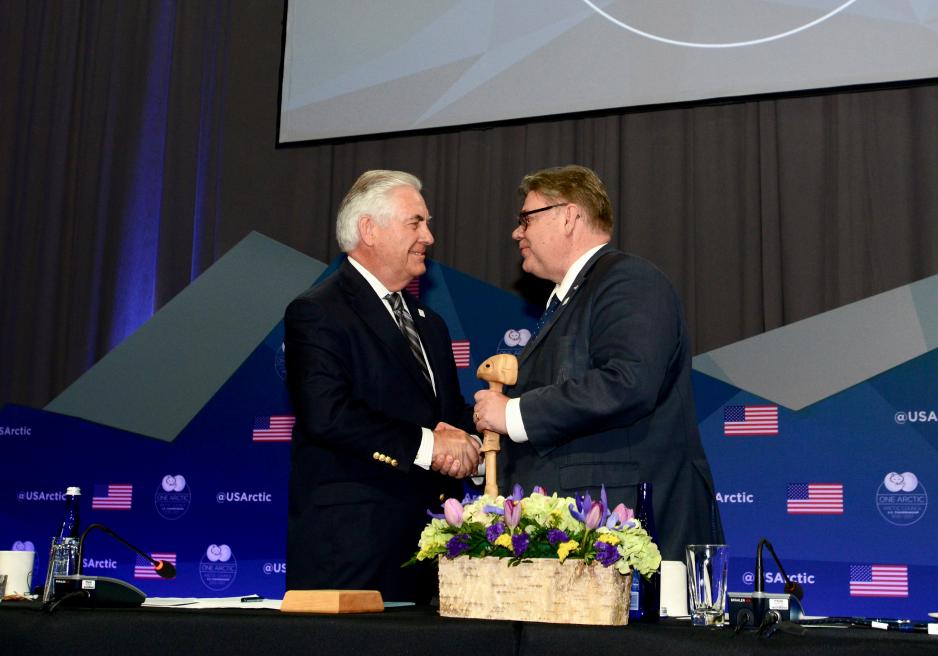Arctic Council: What the US achieved & what Finland is planning

Secretary Tillerson Passes the Chairmanship Gavel to Finnish Foreign Minister Soini. (Photo: U.S. Department of State/Wikimedia Commons)
"The focus on the people of the Arctic is always an important part of the Council’s work", said Julia Gourley, the senior U.S. representative to the Arctic Council during an event the US Embassy in Berlin last week. However, the Arctic also has to look beyond its borders and make use of expertise from other regions, she emphasized.
The event marked the occasion of the recent handover of the Arctic Council chairmanship from the US to Finland, which took place on 11 May during the 10th Arctic Council Ministerial in Fairbanks, Alaska.
During her keynote speech, Ms. Gourley – who is the US Senior Arctic Official (SAO) – outlined some of the achievements and outcomes during the two years of the US chairmanship.
Arctic people in focus
The focus on the people of the Arctic is in line with the focus of the Canadian chairmanship from 2013 to 2015, which focused on "Development for the People of the North." Ms. Gourley explained this focus is because of the many challenges Arctic peoples are facing and the harsher living conditions in comparison to non-Arctic regions.
"Life in the Arctic is generally much more expensive and people in the North have to master long distances for travel and exporting and importing goods", Ms. Gourley explained. Because of these challenges, the Arctic is well advised to look beyond its borders for solutions that other regions have applied to geographical challenges. One example is the usage of microgrids for energy in Africa, she added.
Telecommunications
One major challenge in the Arctic is the limited connectivity.
"There is no broadband and no fiber cables in the Canadian North, for example", the US SAO said. For this reason, during the US chairmanship the Task Force on Telecommunications Infrastructure in the Arctic brought telecommunications experts together to asses existing gaps in telecommunications infrastructure in the region.
To follow-up on the work of the Task Force, the Ministers of the Arctic Council states at the Fairbanks Ministerial meeting established a Task Force on Improved Connectivity in the Arctic. "The Task Force will identify end-user communities and their needs for connectivity, which is a logical second step after the gap analysis during the US chairmanship", Ms. Gourley explained.
Marine Cooperation
Ms. Gourley also reported from the work of another Task Force, namely the one on Arctic Marine Cooperation. This group discussed if the time is ripe for an Arctic regional fisheries management organization to manage and protect Arctic marine resources.
"The US ambition is to put something in place ahead of time", Ms. Gourley emphasized, making sure rules are in place before for example major fisheries activities take place in the region. The mandate of the Task Force was extended for another two years in Fairbanks to focus on a non-binding arrangement on marine cooperation.
Black Carbon
Ms. Gourley reported from major achievements during the US chairmanship in the field of black carbon (also known as soot) and methane mitigation efforts. "Many actors have been cooperating on this issue, including all Arctic states and also many of the observer countries", Gourley said.
Countries have started to and will continue to report on their black carbon emissions and their efforts for reducing them. The Arctic states hope to slow down the melting of Arctic ice a little bit through black carbon reduction, which – when deposited on snow and ice – accelerates their melting through absorbing more heat due to its dark surface.
New legally binding agreement
As the signature achievement of the US chairmanship, Ms. Gourley highlighted the Agreement on Enhancing International Arctic Scientific Cooperation, which was signed at the meeting in Fairbanks. This legally-binding document is the result of a six year-long negation of Arctic Council participants.
"The Agreement does not outline a research agenda; rather, it aims to facilitate to do research in the Arctic", Ms. Gourley explained. It should be made easier for researchers to cross borders within the Arctic, especially concerning Russia’s maritime areas.
The Task Force was co-chaired by Russia and the US, and thus the successful conclusion is a major cooperation achievement.
Smooth transition
In her final remarks, Ms. Gourley promised a smooth transition between the chairmanships. The US delegation already worked closely with the preceding Canadian chairmanship, and the same applies to the following Finnish chair.
"Chairmanships are very important", Ms. Gourley emphasized. Since the Arctic Council is not a full-fledged international organization but rather an intergovernmental forum, the institution is very much run by the country that is chairing it, the US SAO explained.
Ms. Gourley closed with the observation that the member states of the Arctic Council definitely have the Council high on their political agendas. "All eight foreign ministers of the Arctic states came to the Fairbanks Ministerial meeting; the first time this has happened in the history of the Council", Ms. Gourley outlined.
Finnish priorities
Following Ms. Gourley’s talk, Markku Lampinen, Deputy Head of the Finish Embassy in Berlin, outlined the program highlights of the Finnish chairmanship of the Arctic Council. These include four themes - environmental protection, connectivity, meteorological cooperation, and education – which highlight continuity with the US program but also new focus areas.
For example, in the field of meteorology Finland aims to deepen the cooperation between the Arctic Council Working Groups and the World Meteorological Organisation (WMO), Mr Lampinen explained. That the WMO was granted observer status at the Fairbanks meeting is indicative of this ambition.
"In the field of education, Finland aims to build on its experience in providing good-quality education in sparsely populated regions like Lapland", Mr Lampinen outlined. Such experience will hopefully be fruitful for improving education standards in many Arctic regions.
